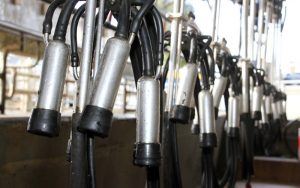
Paul Ashton could have been sent to prison for the sales, but caught a break due to his honesty with authorities about his operation.
Ashton was instead fined $27,500 in the Palmerston North District Court on Monday for breaching raw milk regulations.
Another farmer with his own operation, Daniel Sproull, was fined $20,000 on Monday for also breaching the rules.
The charges stemmed from a clampdown by Ministry for Primary Industries on raw milk production, which led to a series of raids on farms in 2019, with computers, devices and paper records seized.
Nine raw milk suppliers were ultimately charged a year after the raids.
The ministry alleged the farmers were not complying with new regulations, put in place in 2016, designed to try to keep people safe from illnesses associated with raw milk consumption.
The new regulations required sellers to be specifically registered, which came with testing and independent verification requirements.
Ashton and Sproull, along with other farmers raided by the ministry, tried to get around the registration requirements by setting up herd partnerships – something they sought legal advice on before doing.
People would pay into the partnership, which allegedly owned the milked herd, then pay nominal or exact amounts per bottle of raw milk.
In Ashton’s case, people based between Dannevirke and Auckland signed up to a partnership and were asked to pay nominal amounts for milk from his Waipukurau farm.
Milk was then dropped to 18 different collection points across the North Island for customers.
However, some people – including undercover ministry officers – managed to purchase raw milk without being in the scheme.
He was producing up to 720 litres of raw milk per day, selling about 2500 bottles per week and making $596,200 in sales in 2019 with $103,071 in surplus.
He told one ministry officer he was the biggest raw milk supplier.
Ashton let the ministry know what he was doing, meeting with it multiple times to explain the situation and his alternative partnership scheme.
But he kept producing milk despite at one stage getting a notice from the ministry telling him to correctly register.
Sproull had a similar partnership scheme, although he did not sell to people outside it.
His operation was smaller, selling at its peak about 1900L per month from certain collection sites, but he too kept producing despite getting a ministry notice telling him to register.
Judge Lance Rowe said both farmers tested milk regularly for disease, sometimes doing so above and beyond ministry requirements, but there were still issues.
There were suspected campylobacter outbreaks linked to Ashton’s milk in 2017 and 2018, while one in 2020, which got two adults and four children sick, was confirmed to be linked to his milk.
Sproull also had an outbreak linked to his milk in 2018.
The mostly clean operations, as well as honesty with the ministry, helped to reduce the penalties, the judge said.

























